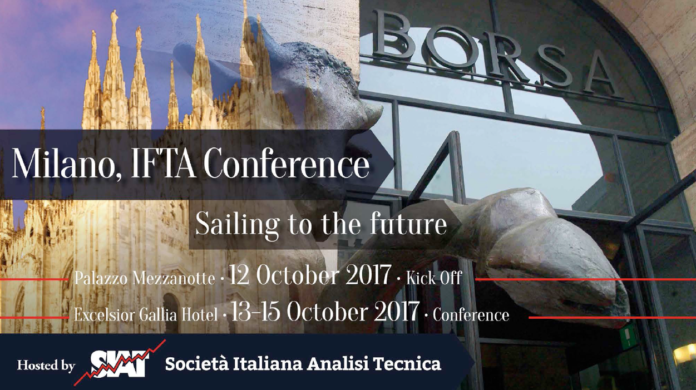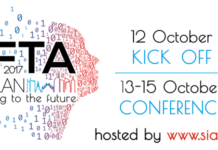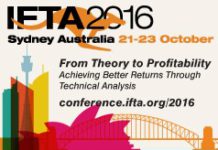Q. After nine years, the 2017 Ifta World Conference will be back in Italy. In 1998 in Rome and now in Milan. What motivated you to propose Italy for the 2017 Conference?
The choice of SIAT to propose to IFTA as host country for the conference is due to a number of factors. First, as you pointed out, they were nearly 20 years IFTA not held in Italy, a reasonably long time for a country with long traditions in technical analysis like ours. Second, in 2016 it changed the directors of SIAT and one of the cardinal points of the newly elected directors was just trying to bring the World Congress in Italy. In addition, Italy and Milan in 2015 hosted the Expo and then everyone in the world had just heard of Milan.
Q. The Ifta World Conference held last year in Sydney, had the participation of two Siat speakers: you, with a revisitation of the trend that leads to an original multi-strategy portfolio, and Andrea Unger with a speech about the evolution of Algorithmic Trading and the role of Technical Analysis. Were these topics an anticipation of what will be covered in the new Milan conference?
Absolutely. The title of the conference, “Sailing to the future”, will allow us to go beyond the usual thematics of Technical Analysis, exploring the sea of opportunities that has been originated by a totally new “quant” generation of technologies, markets and instruments. We will also try to go inside the vast thematic of the contamination between our discipline and many other fields of economics (i.e. Behavioural Finance, AI, Big Data, Cryptocurrencies), with top institutional and academic contributions. Each speech will be selected with regard to its added value to the participants and to the overall evolution of Technical Analysis. I can also say that our idea has had an enthusiastic membership and I can already announce the participation of important speakers as Rober Prechter, John Bollinger, Professor Hank Pruden, Gregor Bauer, Riccardo Ronco (HF manager Caxton and IFTA 1998 Speaker on Chaos Theory, multiwinner of the European Technical Analyst Award), Andrea Unger, Richard L. Peterson, author of “Trading on sentiment” and CEO of MarketPsych, Kathryn Kaminski (author of “Trend Following with Managed Futures: The Search for Crisis Alpha” and fund manager), Spiros Skouras of The Scientific Fund and Alberto Vivanti for SAMT.
Q. Let’s speak about the presence of Technical Analysis in Italy: what was its evolution over the past decade and what is the actual state of the art?
Technical analysis in Italy has grown a lot, both in terms of practitioners, especially with the advent of online trading, both in terms of quality. We must not forget that Italy has a great tradition and level all the times that an Italian was confronted with major worldwide technical analysis has always obtained excellent results. I remember the World Trading Championships of Andrea Unger, Riccardo Ronco at European level (by the way both will be keynote speakers) and let me remember even my personal experience as twice winner of the Leonardo of financial research and recipient of the first edition of IFTA John Brooks Award.
Q. The term “heretics” of finance was the nickname for technical analysts coined by Professor Andrew Lo, based on the fact that the academic world, at the beginning, saw Technical Analysis as a sort of alchemy and thought that Technical Analysis was to financial analysis as astrology was to astronomy. Despite these first historical misgivings, a high number of academics have studied Technical Analysis and have come to several interesting conclusions regarding its benefits and pitfalls. But many investment professionals are still very skeptical about Technical Analysis: how is the situation in Italy about this topic?
I would say that in Italy the pattern identified by Professor Lo has been perfectly followed in recent years. The first attempts to introduce technical analysis academically in Italy are likely to be found in some pioneers as my first master Angelo Bertotti, who wrote in the mid ‘80s a quantitative book about technical analysis with Bocconi’s Professor Andrea Fornasini. Since then, there has been a silent contamination, in the sense that if on one hand the technical analysis was abused as useless, on the other side it was studied carefully, especially in its aspects related to behavioural finance and quantitative modelling. In fact, in recent years there has been an exponential growth in interest in our discipline in the institutional side of asset management and in the academic world. One proof is the success of the institutional SIAT courses and other special seminars. I think the most evolved part of technical analysis will be recognized at all levels in the future.
Q. Looking from the outside, it seems that for the general Italian public, there is more interest for the use of Technical Analysis for short term trading rather than for a more organic and structured approach. Many events of the last times on the Italian territory are in fact based on this topic. Can you confirm or under the appearance there is something more?
It is a correct observation, but I think it’s not only limited to Italy. In all countries, the great diffusion of technical analysis is due to the expansion of online banking and trading, often seen as an alternative mode of income even though we know that to make money in the markets is anything but simple. In fact, in Italy there is a fairly deep culture in technical analysis, albeit limited to persons who for reasons of work or disposition have discussed the issue.
Q. In 2017 in Italy it is officially born the register of financial advisors. Can Technical Analysis be a tool that can come out of its specialist field to be disclosed to this category of investment professionals?
I certainly think so. Our association is carrying out the procedures for recognition at all levels of a professional register which is integrated into this category. It is not an easy road but it is a road required for the, let’s call it “customs clearance”, of technical analysis. As President of the Scientific Committee of SIAT, I am personally involved in the improvement of the public image of italian technical analysis.
Q. Let’s try to understand what type of access may have, for an in-depth Technical Analysis study, a class of people who will build our future: college students. What is your relationship with the university world?
In this sense SIAT is pursuing relationships with the academic world with an unprecedented effort. We are trying to involve different universities and especially some professors who, by their nature or by the affinity of their materials with some parts of technical analysis, are open to the development of partnerships. The IFTA conference in Milan will be the springboard of these initiatives as well as having several important academic names, and we are studying the possibility of supporting a major experiment in behavioral finance that will take place in the same days and place of the event.
Q. Are you planning something particular for this edition of the IFTA Conference in Milan?
Yes. We are also planning a IFTA 2017 Kickoff event that will take place the day before the start of the Conference, on 12 October, in the Italian Stock Exchange with full financial and non financial media coverage. We will have speechs of Raffaele Jerusalmi, CEO of the Italian Stock Exchange, a Deloitte speech on Fintech, Fabrizio Plateroti (Head of Capital Markets & Post Trading Regulation, Borsa Italiana) and Thomson Reuters that will speak on Mifid2, Frederic Leroux (nr 2 of Carmignac Gestion) about the human’s role in asset management, Neil Dwaine (Global Strategist Allianz) on artificial intelligence, Denis Panel, CIO Theam (BNP Paribas) on behavioural finance. We are also planning a round table with Spyros Skouras, John Bollinger, Riccardo Ronco and Professor Sergio Focardi. We have also planned two events, one to promote IFTA with the financial media in early May and the other to promote it with the two largest independent financial organizations in Italy, in early June.
Q. How do you see the evolution of Technical Analysis worldwide in the coming years?
I think that the key challenge is credibility. We must break away from the image of financial alchemists and we must use at its best technology and all branches of our discipline that have a scientific basis or that can be traced back to quantitative or behavioral patterns. As they say in many fields, go big or go home.



